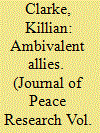|
|
|
Sort Order |
|
|
|
Items / Page
|
|
|
|
|
|
|
| Srl | Item |
| 1 |
ID:
190026


|
|
|
|
|
| Summary/Abstract |
Since the Cold War ended, foreign support has been identified as an important factor in facilitating democratization. However, in certain parts of the world Western enthusiasm for democratization has been highly uneven, particularly when regime change has been achieved through nonviolent revolutionary mobilization. This article introduces the concept of ‘ambivalent allies’ and argues that ambivalence may be highly detrimental to new democracies emerging from nonviolent resistance. Ambivalent allies signal public support for a democratic transition while remaining quietly skeptical about the desirability or viability of the new regime. These misleading signals cause democratic leaders to deprioritize the maintenance of their diverse coalitions, choosing instead an exclusivist approach that alienates their domestic partners. They therefore end up doubly exposed to counterrevolutionary threats, lacking both a broad domestic support base and strong foreign backers. The article illustrates this argument through an examination of Egypt’s 2011 revolution and 2013 coup, drawing on approximately 100 interviews with Egyptian political leaders and foreign diplomats. It shows that the USA’s ambivalence toward the transition contributed to the coup by giving the elected government headed by Mohamed Morsi a false impression that it had strong foreign backing, and that it could afford to marginalize the secularist wing of the original revolutionary coalition. Egypt’s experience is then compared to two cases in which new governments survived counterrevolutionary threats: Burkina Faso in 2014 and Madagascar in 2009. The study contributes to our understanding of how international support may facilitate or undermine democratic consolidation following nonviolent revolutions.
|
|
|
|
|
|
|
|
|
|
|
|
|
|
|
|
| 2 |
ID:
154395


|
|
|
|
|
| Summary/Abstract |
This article discusses three recent books that analyze patterns of political conflict and regime change in postcolonial Asia and Africa using a social forces approach to political analysis. The social forces tradition, originally pioneered by Barrington Moore, studies the social origins and political consequences of struggles between social groups whose members hold shared identities and interests. The works under review examine, respectively, the varied regime trajectories of Southeast Asia's states, divergent regime outcomes in India and Pakistan, and the institutional origins of social cleavages and political conflict in sub-Saharan Africa. Although historically the social forces paradigm has focused on conflict between class actors, the author argues that these three works fruitfully extend the social forces approach to encompass struggles between nonclass social groups, including those defined along the lines of ethnicity, religion, nationality, region, and family. This pluralized version of the social forces approach is better suited to studying patterns of regime change in Asia and Africa, where the paradigm has been less frequently applied than it has been to cases in Europe and Latin America.
|
|
|
|
|
|
|
|
|
|
|
|
|
|
|
|
| 3 |
ID:
161308


|
|
|
|
|
| Summary/Abstract |
Refugees are often considered to be among the world’s most powerless groups; they face significant structural barriers to political mobilization, often including extreme poverty and exposure to repression. Yet despite these odds refugee groups do occasionally mobilize to demand better services and greater rights. In this paper I examine varying levels of mobilization among Syrian refugees living in camps and informal settlements in Turkey, Lebanon, and Jordan in order to explain how marginalized and dispossessed groups manage to develop autonomous political strength. I explain the surprisingly high levels of mobilization in Jordan’s Za’atari Camp compared to the relative quiescence of refugees in Turkish camps and Lebanese informal settlements as the product of a set of strong informal leadership networks. These networks emerged due to two unique facets of the refugee management regime in Jordan: the concentration of refugees in the camp, and a fragmented governance system. In Turkey and Lebanon, where these two conditions were absent, refugees did not develop the strong leadership networks necessary to support mobilization. I develop this argument through structured comparison of three cases and within-case process tracing, using primary source documents from humanitarian agencies, contentious event data, and 87 original interviews conducted in the summer of 2015.
|
|
|
|
|
|
|
|
|
|
|
|
|
|
|
|
|
|
|
|
|